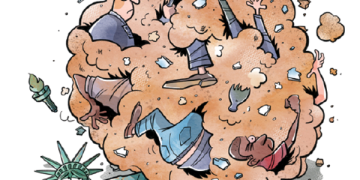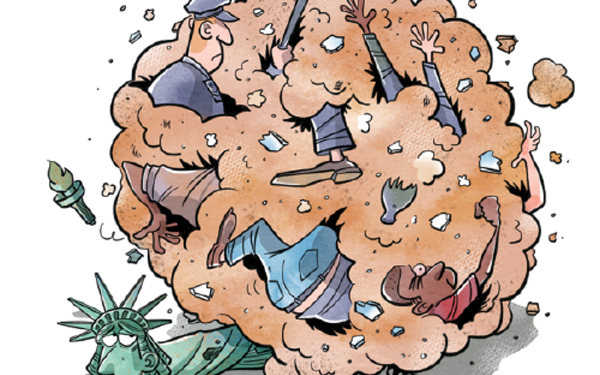China Daily
Today, the United States is facing various internal challenges with its inflation hitting a historical high over the past 40 years and social divisions worsening. The root cause is that the US has been unwilling to face up to its internal problems for a long time and has unilaterally emphasized “external threats” instead, resulting in worse drawbacks. The US should change its Cold War mentality and seek development through dialogue and cooperation with other major powers.
The domestic dilemma of the US is related to the exogenous crisis, but it is more caused by its long-standing social and economic maladies. Due to the lack of social and partisan consensuses, it is difficult for the country to advance systematic reform to treat these “chronic diseases”. The US has strong power of execution in dealing with short-term crises, but the absence of long-term planning of emergency response policies may lead to lagging negative impacts.
For example, the US expanded its fiscal deficit to more than 10 percent of its GDP and implemented a loose monetary policy from 2020 to 2021. These relief measures taken in response to the COVID-19 pandemic have led to this year’s high inflation. On some social governance issues, such as pandemic prevention, the US government has been trapped because public opinion is split and it has struggled to formulate unified and effective policies. In the case of stagnant reform, the continuous fermentation of social and economic problems has exacerbated social divisions and public anxiety, fomented populist movements and anti-intellectualism, and increased the difficulty of social governance.
US political scientists point out that the US must seek social consensus to break the vicious circle of blocked reform and social division, and the basis for consensus building is to listen to social demands and improve people’s livelihoods with practical measures. In September 2020, the Carnegie Foundation released a report titled “Making US Foreign Policy Work Better for the Middle Class”, suggesting that Joe Biden, who was running for president, should understand more deeply “domestic economic and social issues and their complex interaction with foreign policy decisions”. The report holds that the US government has been committed to confrontational ideas such as “sustaining US primacy” and “a new Cold War”, rather than trying to solve domestic problems related to the vital interests of its people. Therefore, it is unable to unite society.
Compared with transferring the contradiction outward, the report highlights domestic reforms through constructive international cooperation, so as to enhance the long-term economic competitiveness of the US.
However, the US has actually returned to the outdated track of a new Cold War since 2021, and has further intensified its efforts to promote major-power rivalries. The fundamental reason is that the US elites are still obsessed with the confrontation between major powers, although they have realized that the crux of the country’s malaise is at home. The Carnegie report suggests that the US cooperate with “like-minded allies”, but ignores equal dialogue with other countries.
In addition, US politicians are used to publicly hyping up the so-called China threat and discrediting the international cooperation initiatives launched by China in order to promote its domestic reform plans and peddle its own international cooperation programs such as “Build Back Better World”. Although many senior US officials said that they would not seek a “new Cold War”, their “value diplomacy” is intensifying the game between China and the US, which is more harmful than beneficial to solving the internal problems of the latter.
The aggressive foreign policy of the US has triggered a global crisis, which in turn has exacerbated its domestic plight. For example, the trade war, economic sanctions and technology embargo launched by the US against China have damaged the global supply chains, and the supply shortage has pushed up the US inflation. The US is also politicizing issues such as the COVID-19 pandemic, which makes it impossible for major countries to coordinate policies and makes global governance difficult.
Inflation and the energy crisis also have a negative impact on the Biden administration’s biggest domestic performance-the bipartisan infrastructure construction bill with a total investment of $1.2 trillion. As of June, the cost of the construction industry in the US has increased by 8.6 percent compared with a year ago. Infrastructure bidding in various states has reached a high price of up to 30 percent above the budget, which means that Biden’s infrastructure investment plan will shrink significantly.
The “liberal hawks” in the US indulge in the unipolar hegemony of the US after the Cold War, and believe that the US can exclude China, Russia and some other countries from the international system by forming an “alliance of values”, unilaterally formulate international rules and solve global challenges, and create an external environment conducive to its mid- and long-term domestic reform.
However, today’s world is a highly interconnected and multipolar community. Dialogue and cooperation among major countries play a key role in dealing with global issues such as the pandemic and climate change, and are also indispensable for the US to keep its economy on a normal track. On the contrary, an out-of-control confrontation between major powers will produce a chain of negative reactions and impact the global political and economic system. The US will not be an exception.
The US administration’s “value diplomacy” has not formed any consensus in the divided domestic society, but created an “anti-China sentiment” among decision-makers in Washington, preventing the government from solving internal and external problems through cooperation with China. For example, the tariffs imposed by the Trump administration on China still cause an extra spending of $51 billion from US enterprises and consumers every year, but the US government has been reluctant to admit itself outdone on the issue.
The crisis-plagued US administration recently softened its position on China-US relations. For example, US Secretary of State Antony Blinken reiterated the US will pursue “six must-nots” during the meeting of foreign ministers between the two countries, sending a positive signal on the China-US dialogue relations. However, with a Cold War mindset, some US politicians still intend to gain advantage in negotiations by putting “extreme pressure” on China, and repeatedly testing it on core issues such as the Taiwan question, which is harmful to solving their domestic problems. The US should learn from the recent crisis and realize that confronting China is not an effective way to treat its domestic ills.





